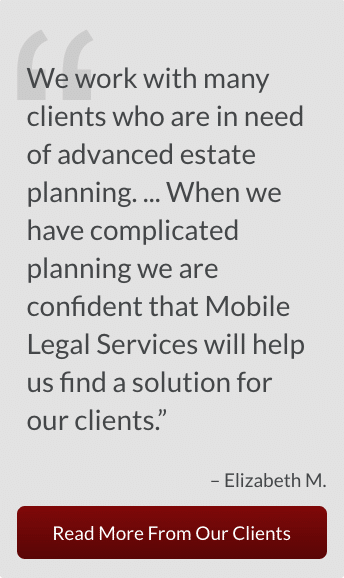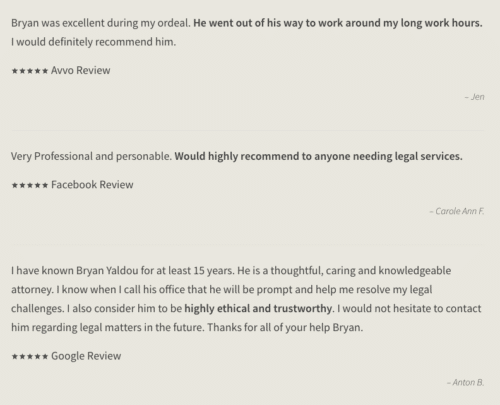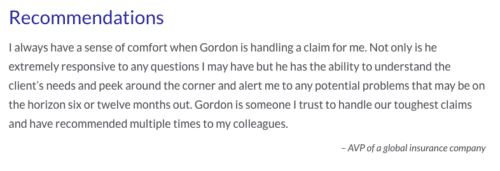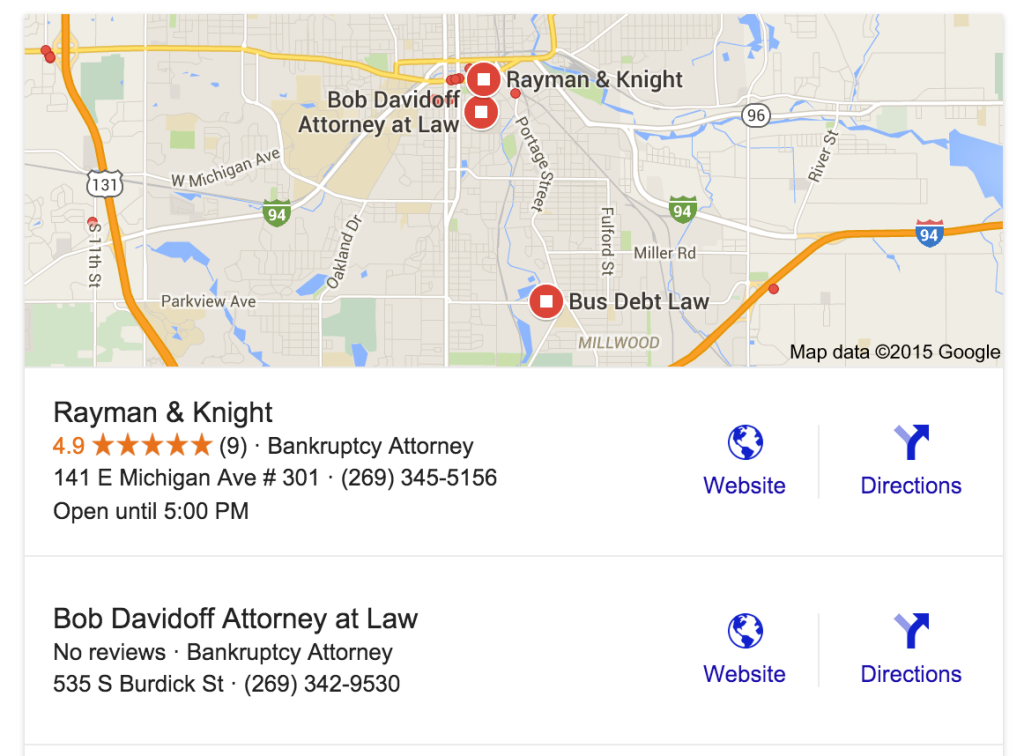Menu
June 13th, 2017

We have a few theories about why. And we'll also offer several things for attorneys to think about when considering whether to feature testimonials on their law firm's website.
In this first article of a three-part series on client testimonials, we hit on data and logic regarding the effectiveness of displaying testimonials on your website. Next we address the ethics of client testimonials in the legal field — including rules of professional conduct governing attorney advertising — and then offer a step-by-step How To on gathering testimonials from your clients.
Are Client Testimonials Effective?
YES, yes, yes, yes, and yes. And maybe. Let us explain.
Third-Party Validation
First and foremost, as our data suggests, testimonials pages are very popular. The strong inference is thus that potential clients value them. And it makes sense that they do. Testimonials (or reviews — we'll use these terms interchangeably for the moment) speak positively about you in the words of a third party. Your site visitors thus don't just have to take your word that you're a great lawyer whom they should consider hiring: they can also read direct comments from people who did hire you and were happy they did. Moreover, there is only so much you can say about yourself without sounding boastful.
To use a courtroom metaphor, testimonials — like actual case results and verifiable biographical items such as honors, education and years in practice — are evidence in support of your (obviously potentially biased) claims about yourself and the benefits of hiring your firm. They are like the testimony of an eye witness compared to that of a party to the case: the jury might believe both, but validation by a more or less objective witness goes a long way in bolstering the party's story.
The fact that consumers value testimonials and reviews is of course also evidenced by the proliferation of online ratings for businesses in general (like we see on Yelp, FaceBook, Google, etc.) as well as the attorney-specific ratings offered by sites like Avvo and Martindale-Hubbell. If you're not yet convinced of the power of testimonials, just ask yourself how you search for a service online. And, if you were looking at a particular service provider's website to evaluate whether to call them — and you saw a big button or menu item that said "Reviews" — would you click on it?
Interestingly, most of us place some value on reviews displayed on a service provider's site even though we know that, at best, they're carefully curated — and, at worst, they're totally made up. Most of us at least take a look at them, whether it's because of our faith in humanity or simply our instinct to collect all the information we can, even if we take some of it with a grain of salt.
What You're Really Like
Very much in this vein, but worth thinking about separately, is the personable nature of testimonials. We often remind attorneys, particularly with regard to their website profiles, that clients hire people — not just skill sets. A legal consumer needs a sense of you as a person who they will need to work closely with, disclose confidences to, and trust to represent them in the right light before third parties.
We work with our attorney clients to communicate their personalities and character as much as is appropriate using their website text and designs. But, unlike fun tech companies, catchy bloggers, and 98% of the rest of world putting themselves out there on the Internet, attorneys are comparably limited in how creative they can get in expressing their brands online. Unless you're Saul Goodman, you likely actually want to comply with your bar rules on attorney advertising, many of which carefully govern how you portray yourself. Further, most of your clients probably are not looking for viral videos, a trendy mascot, or a whimsical tone. Clients more often want to see a certain amount of seriousness — and often even aggressiveness. Indeed, as they get a first impression of you from the way you express yourself on your website, they are likely imagining the first impression you will make on an opponent, judge, or jury.
Client testimonials offer insight into what you're like to work with from the client's perspective. They may reinforce some of that seriousness or aggressiveness. But they can also say what you can't as comfortably or credibly say yourself, such as how a client breathed a sigh of relief after their first consultation with you, how impressive you sounded in the courtroom, or even how nice you are in person despite your reputation for aggressiveness at trial.
Who Your Clients Really Are
Perhaps as important, client testimonials give the reader a sense of what your clients are really like. It's great if a prospective client can relate to your past clients and see something of him- or herself in their comments. If your clientele is mostly rural or tend to work blue collar jobs (let us over-generalize for a moment just to illustrate a point), allow past clients to speak to future ones without the fancy schmancy vocabulary we lawyers cherish. If your work stretches across language barriers and you often serve folks for whom English is a second language, consider allowing your clients to offer reviews in their native languages. If you're targeting highly educated professionals, let them see that your existing clients are relatably articulate and came to you for concerns similar to their own.
Not Just Words

Testimonials can also engage your site visitors through images and video. Photos of your clients are great when the clients are comfortable with your displaying them. Video testimonials go well beyond the written word, giving prospects a real sense of who you serve, how you helped, and the difference you made in past clients' lives. Scans of thank-you cards from grateful clients can also be a nice touch.
Benefits Re: Existing Clients
A more hidden benefit to requesting testimonials for your website is the effect on the former clients whom you ask to contribute their thoughts. We've had more than a few attorneys tell us they feel awkward asking their clients for reviews or testimonials. (More on how to deal with that awkwardness — and exactly what to say — in our post on how to request client testimonials.) But consider the benefits.
First, asking a former client to think about the positive aspects of working with you reminds them of your good qualities and solidifies for them why it is they chose to hire you. Don't underestimate this opportunity to reinforce their reasons for hiring you again or for confidently referring you to someone else. Indeed, these direct personal connections are just as (if not even more) valuable as an effective website.
Second, and relatedly, asking for a testimonial offers you a natural and transparent way to connect with former clients and keep yourself and your services top-of-mind. As just mentioned, some lawyers seem to feel, uh ... yucky ... (for lack of a better word) about asking because it smacks of self-promotion. But, let's face it: as a solo or small firm lawyer, your livelihood depends in part on self-promotion. You might be promoting yourself directly through ads (from YellowPages to Google AdWords to sponsoring a quarter page in a local playbill or church bulletin) or indirectly through participation in civic events, sitting on non-profit boards, or even golfing. Either way, your need to grow and maintain your business is no secret. Transparently asking for a testimonial should feel no yuckier than sponsoring your local pink ribbon 5k in part in order to get your name out there into the community. And, like that banner with your firm logo hanging from the water cup table at the 2.5k mark, asking for a testimonial gives you a chance to connect and remind folks you're available if needed.
Finally, your clients may well take it as a compliment that you're asking for their vote of confidence. The fact that you're interested their opinions — and are generally open to their feedback, even if it includes criticism — allows them to feel valued and speaks well of your commitment to customer service.
But: Consumer vs. More Sophisticated / B2B Practices
The one area in which some of this advice breaks down is very sophisticated legal practice, such as representation involving larger corporations, complex and high-stakes subject matter like securities law, or contact primarily with in-house counsel or other lawyers. Law firms that want to appear selective and well-established (and perhaps highly confidential) often choose to avoid any appearance of "advertising" (and/or outing their clients) on their websites, sticking instead to a few basics in order to leave the impression that their work and reputations simply speak for themselves. Certainly we're sensitive to the fact that a balance must be struck here. But, even if you lean in this direction, we still recommend that you at least consider the benefits of testimonials — or something like them — before entirely ruling them out.
One option is to frame testimonials more along lines of professional endorsements or recommendations. These may even be comments from colleagues or quotes drawn from statements by judges about your firm in public court opinions (yes — some of our clients actually have these!). Such comments might also be woven into representative work or case study sections of your website, where you offer a summary of a particular matter incorporating a brief quote from the client.
Key here is to remember that, although firms working in certain elite legal arenas may feel they must present themselves in almost aloof terms to be taken seriously, ultimate decisions to hire a lawyer are made by actual human beings. They might be lower level in-house attorneys or staff who will research attorneys and report options to a committee or board. Or they might be final decision-makers comparing a pile of similar attorney resumes. Whoever they are, do give some thought to whether your website connects with those human beings during their law firm vetting process.
Do Client Testimonials Help Search Engine Optimization?
Good question. As a threshold matter, in talking about SEO, we can no longer use "testimonials" and "reviews" interchangeably. For, although there might be good reason to call the client quotations on your website "reviews," these self-curated reviews now must be distinguished from reviews on third party sites.
Reviews on third party sites — Google being the exemplar if we're talking SEO for Google searches — play an important role in SEO. These are a whole different animal than the reviews you personally collect for use on your own website, worthy of their own entirely separate discussion. But, in short, such reviews are an organic ranking factor and they offer an important boost in SERPs and local pack results. We've asked it before, we'll ask it again: which law firm do you think is getting more clicks from these local search results?
So, your strategy with regard to client reviews / testimonials will likely be two-pronged: you should personally gather testimonials for use on your own site and encourage clients to review you on third-party sites. (If you're a TMF client and you need help with encouraging those reviews, our Local Marketing Fundamentals program has you covered.)
With regard to the SEO value of the self-curated testimonials on your website, there are also definitely opportunities to optimize your testimonials section. At TMF, for example, we have a custom WordPress post-type for testimonials, such that they both: display together nicely on a single page, and; each have their own distinct urls. Thus we can optimize both your main testimonials page and each individual comment.
Importantly, you should know from the outset that, even with well-optimized testimonials, your site is unlikely to make a strong organic showing for searches on general attorney reviews in your area, given you're up against all the large review-aggregating websites. And these larger sites are also likely to push you lower in the search results even for users specifically looking for reviews of you or your firm. But individually optimized testimonials do have some skin in the SEO game when it comes to searches for reviews of you by name. Take a look at these Google results for "reviews of attorney frank nunes", for instance. Not only has Frank received good reviews on third-party sites — note all those nice stars in the search results! — but the testimonials from his own website start showing up just half a dozen spots down on page one, displaying great excerpts of his clients' comments right in the search results.
Ok, I'm Convinced: How Do I Get Good Testimonials?
If you're ready to gather some testimonials for your site, good news: next up we'll cover the rules of professional conduct governing attorneys' promotion of client testimonials and provide a complete How To on ways to solicit testimonials, how many you should start with, and how they should be attributed.
Categories: Question of the Week
Tags: Reviews & Testimonials







